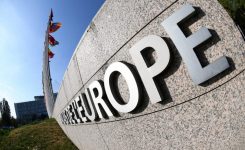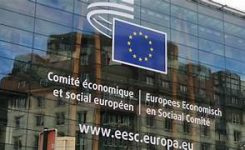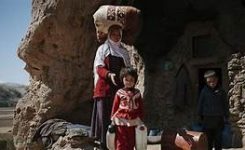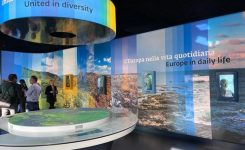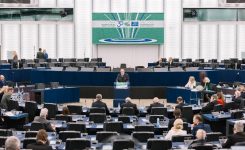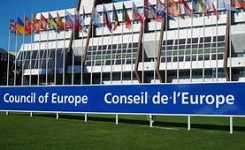News Platforma, E-News, vcs, In Evidenza, Ultime Notizie, Notizie, Platforma
Obiettivo 2030, Rey: “Importante ruolo Associazioni nazionale enti locali per includere tutti in un mondo interconnesso e sostenibile”
L’AICCRE, attraverso il Segretario generale Carla Rey, ha partecipato il 19 novembre alla conferenza internazionale organizzata dal Ministero Federale Tedesco per la Cooperazione e lo Sviluppo Economico (BMZ), dall’Agenzia di Servizio Comunità in un Mondo (SKEW) di Engagement Global, da PLATFORMA e dalla Direzione Generale per la Cooperazione Internazionale e lo Sviluppo (DG DEVCO).
La conferenza si è rivolta principalmente ai rappresentanti dei comuni tedeschi ed europei e ai comuni partner dei paesi del Sud del mondo che hanno esperienza diretta e/o interesse nell’attuazione dell’Agenda 2030 e degli SDG.
Carla Rey nel suo intervento si è innanzitutto
congratulata con gli organizzatori perché “è stato dato spazio alle associazioni nazionali di enti locali. Molto spesso si guarda ai risultati ottenuti dalle città, mentre non si da gran credito alle associazioni nazionali, il cui ruolo invece è stato evidenziato nelle sessioni della Conferenza organizzata dal ministero federale tedesco”. Infatti, una sessione che puntava sullo scambio di esperienze concrete e risultati ottenuti ha dimostrato l’utilità sui territori delle associazioni, “anche perché nella loro visione strategica, esse non lasciano indietro nessuno, come sottolinea l’Agenda 2030, “To Leave no one behind”.
Oltre a questa motivazione, la dirigente dell’AICCRE ne ha aggiunte altre, concrete e con una nuova visione politica includente ed articolata: “le associazioni di enti locali sono facilitatori delle città: fanno training, fanno formazione ed offrono supporto. Noi Associazioni lo stiamo facendo anche per quanto riguarda l’implementazione degli SDGs dell’Agenda 2030”.
Queste attività, ha aggiunto il Segretario generale, consentono di non tralasciare città medio-piccole che altrimenti da sole non avrebbero gli strumenti e le risorse per organizzarsi e raggiungere gli obiettivi che invece hanno le grandi città”.
La Rey allarga gli orizzonti: “Il ruolo delle associazioni nazionali è ancor più prezioso, in questo senso, in quanto lo sviluppo di un territorio deve essere considerato nel suo complesso e visto che noi lavoriamo con tutti, gli associati, i membri, gli enti locali la nostra mission sta soprattutto in questo”.
La visione italiana che include e che valorizza si è concretizzata, tra l’altro, anche con SDG Portal for Italy, ideato dall’AICCRE e sviluppato nell’ agreement di Platforma con la Commissione europea, che presenta gli indicatori SDG a livello locale, ed è il risultato della partnership tra AICCRE, la Fondazione Eni Enrico Mattei (FEEM), la Bertelsmann Stiftung e l’Associazione nazionale degli enti locali tedeschi Deutscher Statetag (DST).
E’ l’unico portale italiano che offre dei dati: “per ogni SDG abbiamo dato dei valori alle città capoluogo di provincia. Il progetto italiano è quello del portale globale, strumento utile per la cooperazione internazionale”, ha sottolineato la Rey.
“Uno strumento aperto e libero, utilizzabile dai governi centrali, dalle città, ma anche dai cittadini per monitorare quelle che sono le attività legate agli SDG”.
A proposito di inclusione e di visione prospettica strategica il dirigente AICCRE ha precisato che “Il portale globale ha l’ambizione di accogliere tutti. Speriamo che molti Paesi vogliano unirsi all’idea di pianificazione degli SDGs, di indicatori degli SDG. Se adesso già abbiamo avuto l’adesione del Marocco, l’idea Italiana quella di riceverne il più possibile, in modo tale che le città del mondo utilizzino lo stesso strumento, ha concluso.
I lavori della Conferenza si sono quindi concentrati sull’impegno locale per l’attuazione dell’Agenda per lo sviluppo sostenibile del 2030 e dei 17 Obiettivi di Sviluppo Sostenibile (SDG). Durante la conferenza gli enti locali hanno presentato le loro esperienze su come sono riusciti ad ancorare quotidianamente gli SDG nei loro territori. Inoltre, la conferenza ha dimostrato come le sfide nell’attuazione degli SDG possono essere affrontate nell’ambito dei partenariati comunali. Gli input, le discussioni ed i workshop hanno dimostrato la preziosità degli scambi intercomunale.
ENGLISH VERSION
AICCRE, through its Secretary General Carla Rey, participated on November 19th in the international conference organized by the German Federal Ministry for Economic Cooperation and Development (BMZ), the Community in a World Service Agency (SKEW) of Engagement Global, PLATFORMA and the Directorate General for International Cooperation and Development (DG DEVCO). The conference was mainly addressed to representatives of German and European municipalities and partner municipalities from the countries of the South of the world who have direct experience and/or interest in the implementation of Agenda 2030 and SDG.
Carla Rey in her speech first of all congratulated the organisers because “space was given to national associations of local authorities. Very often we look at the results obtained by the cities, while we do not give much credit to the national associations, whose role was highlighted in the sessions of the Conference organised by the German Federal Ministry”. In fact, a session that focused on the exchange of concrete experiences and results obtained demonstrated the usefulness of the associations’ territories, “also because in their strategic vision, they do not leave anyone behind, as Agenda 2030 underlines, “To Leave no one behind”.
In addition to this motivation, the AICCRE manager added others, concrete and with a new political vision including and articulated: “the associations of local authorities are facilitators of the cities: they do training and offer support. We Associations are also doing this with regard to the implementation of the SDGs of Agenda 2030”.
These activities, added the Secretary General, make it possible not to neglect small and medium-sized cities that otherwise alone would not have the tools and resources to organise themselves and achieve the objectives that big cities have”.
Ms Rey added: “The role of the national associations is even more precious in this sense, since the development of a territory must be considered as a whole and since we work with everyone, the members, the local authorities, our mission lies above all in this”.
The Italian vision that it includes and enhances has also materialised, among other things, with the SDG Portal for Italy, conceived by AICCRE and developed in the Platforma agreement with the European Commission, which present the SDG indicators at local level, and is the result of the partnership between AICCRE, the Fondazione Eni Enrico Mattei (FEEM), the Bertelsmann Stiftung and the National Association of German Local Authorities Deutscher Statetag (DST).
It is the only Italian portal offering data: “for each SDG we have given values to the provincial capital cities. The Italian project is that of the global portal, a useful tool for international cooperation”, stressed Rey.
“An open and free tool that can be used by central governments, cities, but also by citizens to monitor SDG-related activities”.
On the subject of inclusion and strategic prospective vision, the AICCRE manager pointed out that “The global portal has the ambition to welcome everyone. We hope that many countries will join the idea of planning SDGs, SDG indicators. If we already have Morocco’s membership now, the Italian idea is to receive as many as possible, so that cities around the world will use the same tool, he concluded.
The work of the Conference therefore focused on local efforts to implement the 2030 Sustainable Development Agenda and the 17 Sustainable Development Goals (SDGs). During the conference, local authorities presented their experiences on how they have managed to anchor SDGs in their territories on a daily basis. In addition, the conference demonstrated how challenges in the implementation of SDG can be addressed within the framework of municipal partnerships. The inputs, discussions and workshops demonstrated the value of inter-municipal exchanges.

